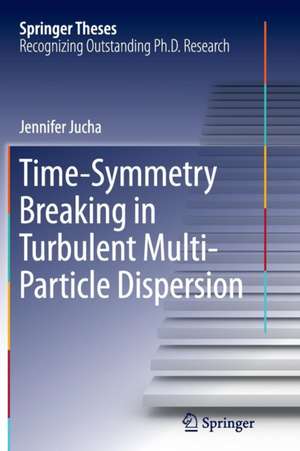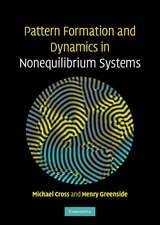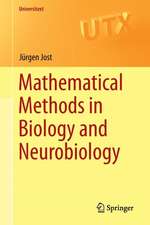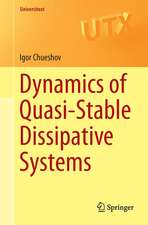Time-Symmetry Breaking in Turbulent Multi-Particle Dispersion: Springer Theses
Autor Jennifer Juchaen Limba Engleză Paperback – 17 oct 2016
The term turbulence describes a special state of a continuous medium in which many interacting degrees of freedom are excited. One of the interesting phenomena observed in turbulent flows is their time irreversibility. When milk is stirred into coffee, for example, highly complex and interwoven structures are produced, making the mixing process irreversible.
This behavior can be analyzed in more detail by studying the dispersion of particle clusters. Previous experimental and numerical studies on the time asymmetry in two-particle dispersion indicate that particles separate faster backwards than forwards in time, but no conclusive explanation has yet been provided.
In this thesis, an experimental study on the short-time behavior of two- and four-particle dispersion in a turbulent water flow between two counter-rotating propellers is presented. A brief but rigorous theoretical analysis reveals that the observed time irreversibility is closely linked to the turbulence energy cascade. Additionally, it is demonstrated experimentally that the addition of minute amounts of polymers to the flow has a significant impact on multi-particle dispersion due to an alteration of the energy cascade.
| Toate formatele și edițiile | Preț | Express |
|---|---|---|
| Paperback (1) | 632.22 lei 43-57 zile | |
| Springer International Publishing – 17 oct 2016 | 632.22 lei 43-57 zile | |
| Hardback (1) | 638.24 lei 43-57 zile | |
| Springer International Publishing – 30 iul 2015 | 638.24 lei 43-57 zile |
Din seria Springer Theses
- 18%
 Preț: 997.88 lei
Preț: 997.88 lei -
 Preț: 389.88 lei
Preț: 389.88 lei - 15%
 Preț: 646.94 lei
Preț: 646.94 lei - 18%
 Preț: 943.43 lei
Preț: 943.43 lei -
 Preț: 399.29 lei
Preț: 399.29 lei - 18%
 Preț: 944.99 lei
Preț: 944.99 lei - 15%
 Preț: 636.80 lei
Preț: 636.80 lei - 18%
 Preț: 941.05 lei
Preț: 941.05 lei - 15%
 Preț: 643.16 lei
Preț: 643.16 lei - 15%
 Preț: 642.68 lei
Preț: 642.68 lei - 18%
 Preț: 1103.62 lei
Preț: 1103.62 lei - 20%
 Preț: 558.83 lei
Preț: 558.83 lei - 18%
 Preț: 1112.30 lei
Preț: 1112.30 lei - 18%
 Preț: 944.19 lei
Preț: 944.19 lei - 18%
 Preț: 1109.92 lei
Preț: 1109.92 lei - 18%
 Preț: 1217.27 lei
Preț: 1217.27 lei - 15%
 Preț: 640.06 lei
Preț: 640.06 lei - 15%
 Preț: 636.45 lei
Preț: 636.45 lei - 15%
 Preț: 640.06 lei
Preț: 640.06 lei - 15%
 Preț: 640.88 lei
Preț: 640.88 lei -
 Preț: 389.70 lei
Preț: 389.70 lei - 20%
 Preț: 563.91 lei
Preț: 563.91 lei -
 Preț: 393.35 lei
Preț: 393.35 lei - 15%
 Preț: 637.93 lei
Preț: 637.93 lei - 15%
 Preț: 641.85 lei
Preț: 641.85 lei - 18%
 Preț: 1225.94 lei
Preț: 1225.94 lei - 20%
 Preț: 551.36 lei
Preț: 551.36 lei - 18%
 Preț: 1229.10 lei
Preț: 1229.10 lei - 15%
 Preț: 639.25 lei
Preț: 639.25 lei - 18%
 Preț: 999.45 lei
Preț: 999.45 lei - 15%
 Preț: 640.06 lei
Preț: 640.06 lei - 18%
 Preț: 1220.45 lei
Preț: 1220.45 lei - 18%
 Preț: 1116.26 lei
Preț: 1116.26 lei - 18%
 Preț: 1110.72 lei
Preț: 1110.72 lei - 18%
 Preț: 1000.87 lei
Preț: 1000.87 lei - 18%
 Preț: 891.17 lei
Preț: 891.17 lei - 15%
 Preț: 640.06 lei
Preț: 640.06 lei - 5%
 Preț: 1154.07 lei
Preț: 1154.07 lei - 15%
 Preț: 635.96 lei
Preț: 635.96 lei - 15%
 Preț: 640.88 lei
Preț: 640.88 lei -
 Preț: 387.20 lei
Preț: 387.20 lei - 18%
 Preț: 1109.92 lei
Preț: 1109.92 lei -
 Preț: 385.25 lei
Preț: 385.25 lei -
 Preț: 385.25 lei
Preț: 385.25 lei - 18%
 Preț: 1112.30 lei
Preț: 1112.30 lei - 18%
 Preț: 999.45 lei
Preț: 999.45 lei -
 Preț: 386.99 lei
Preț: 386.99 lei - 15%
 Preț: 637.13 lei
Preț: 637.13 lei - 20%
 Preț: 554.21 lei
Preț: 554.21 lei - 20%
 Preț: 555.59 lei
Preț: 555.59 lei
Preț: 632.22 lei
Preț vechi: 743.79 lei
-15% Nou
Puncte Express: 948
Preț estimativ în valută:
121.01€ • 131.49$ • 101.72£
121.01€ • 131.49$ • 101.72£
Carte tipărită la comandă
Livrare economică 21 aprilie-05 mai
Preluare comenzi: 021 569.72.76
Specificații
ISBN-13: 9783319373669
ISBN-10: 3319373668
Pagini: 125
Ilustrații: XII, 113 p. 42 illus., 22 illus. in color.
Dimensiuni: 155 x 235 x 7 mm
Greutate: 0.19 kg
Ediția:Softcover reprint of the original 1st ed. 2015
Editura: Springer International Publishing
Colecția Springer
Seria Springer Theses
Locul publicării:Cham, Switzerland
ISBN-10: 3319373668
Pagini: 125
Ilustrații: XII, 113 p. 42 illus., 22 illus. in color.
Dimensiuni: 155 x 235 x 7 mm
Greutate: 0.19 kg
Ediția:Softcover reprint of the original 1st ed. 2015
Editura: Springer International Publishing
Colecția Springer
Seria Springer Theses
Locul publicării:Cham, Switzerland
Cuprins
Motivation.- Introduction and Theory.- Experimental Methods,- Two-Particle Dispersion.- Four-Particle Dispersion.- The Effect of Polymers.- Discussion and Perspectives.
Notă biografică
Dr. Jennifer Jucha studied physics at the Johannes Gutenberg-Universität Mainz. She obtained her diploma with honors in 2011, before joining the Max Planck Institute for Dynamics and Self-Organization, Göttingen, for her doctoral research. She received her PhD in Physics in 2014 for her experimental and theoretical work on the time irreversibility of particle dispersion in turbulent flows. In 2015, she was awarded a research fellowship from the Humboldt Foundation for a project at Ecole Normale Supérieure de Lyon studying the motion of macroscopic particles in a turbulent flow.
Textul de pe ultima copertă
This thesis presents experimental and theoretical investigations of the connection between the time asymmetry in the short-time evolution of particle clusters and the intrinsic irreversibility of turbulent flows due to the energy cascade.
The term turbulence describes a special state of a continuous medium in which many interacting degrees of freedom are excited. One of the interesting phenomena observed in turbulent flows is their time irreversibility. When milk is stirred into coffee, for example, highly complex and interwoven structures are produced, making the mixing process irreversible.
This behavior can be analyzed in more detail by studying the dispersion of particle clusters. Previous experimental and numerical studies on the time asymmetry in two-particle dispersion indicate that particles separate faster backwards than forwards in time, but no conclusive explanation has yet been provided.
In this thesis, an experimental study on the short-time behavior of two- and four-particle dispersion in a turbulent water flow between two counter-rotating propellers is presented. A brief but rigorous theoretical analysis reveals that the observed time irreversibility is closely linked to the turbulence energy cascade. Additionally, it is demonstrated experimentally that the addition of minute amounts of polymers to the flow has a significant impact on multi-particle dispersion due to an alteration of the energy cascade.
The term turbulence describes a special state of a continuous medium in which many interacting degrees of freedom are excited. One of the interesting phenomena observed in turbulent flows is their time irreversibility. When milk is stirred into coffee, for example, highly complex and interwoven structures are produced, making the mixing process irreversible.
This behavior can be analyzed in more detail by studying the dispersion of particle clusters. Previous experimental and numerical studies on the time asymmetry in two-particle dispersion indicate that particles separate faster backwards than forwards in time, but no conclusive explanation has yet been provided.
In this thesis, an experimental study on the short-time behavior of two- and four-particle dispersion in a turbulent water flow between two counter-rotating propellers is presented. A brief but rigorous theoretical analysis reveals that the observed time irreversibility is closely linked to the turbulence energy cascade. Additionally, it is demonstrated experimentally that the addition of minute amounts of polymers to the flow has a significant impact on multi-particle dispersion due to an alteration of the energy cascade.
Caracteristici
Winner of the Dr. Berliner and Dr. Ungewitter Prize of the University of Göttingen Investigates turbulent particle dispersion from a new perspective Employs experimental and numerical data, together with a new analytical approach Demonstrates the effect of polymers on fully developed turbulence far from boundaries Includes supplementary material: sn.pub/extras











